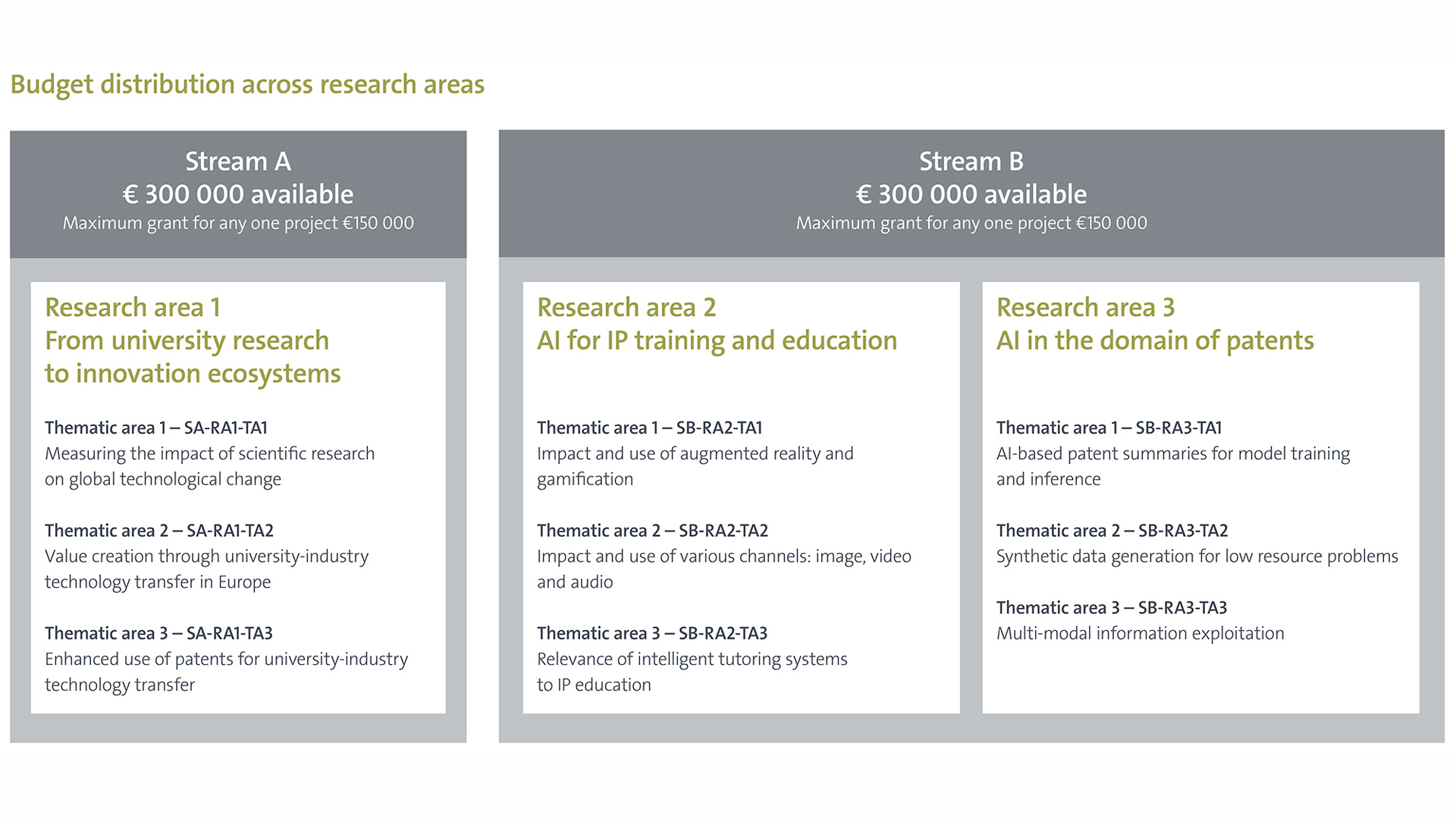Academic Research ProgrammeOverview
Academic Research Programme
Summary

The next call is foreseen for 2024.
The EPO recognises the importance of high-quality research on patent-related intellectual property (IP) matters to inform policymakers and facilitate sound business decisions in a context where intangible assets, innovation and IP rights have become pivotal in the economy. With our Academic Research Programme (EPO ARP), launched in 2017, we seek in particular to encourage more academic IP research and to promote the dissemination of research results.
In order to facilitate effective research collaboration, we support collaborative research schemes in which scientific partner institutions team up to work on projects with a broader scope, bigger budget and longer duration, and with the potential to involve a range of EPO departments.
This year, the EPO ARP comprises two main streams:
- Stream A: The new frontiers of innovation (one research area)
- Stream B: Digital technologies for IP (two research areas).
Each stream focuses on a clearly defined research area supported by the respective EPO departments.
Under EPO ARP researchers can benefit from:
- collaborative research schemes involving relevant EPO departments
- research schemes built up of a consistent set of sub-projects
- the possibility to involve scientific partner research institutions
- more time to carry out the research
- an attractive grant package of up to EUR 150 000 per scheme

Details
Creative industries increasingly rely on collaboration and technology transfer with research institutions to expand their knowledge base, seize innovation opportunities and develop competitive advantages to sustain long-term growth. However, the innovation potential of university-industry ecosystems is rarely exploited to its full extent. Increasing the impact of university research on the economy remains a key policy objective in Europe. Further evidence is needed in particular to understand how technology transfer works between universities and industry and to identify levers to maximise the impact of this transfer.
This stream calls for projects focusing on the impact of academic research on industrial innovation and the economy. Universities and public research organisations are key players in today's innovation ecosystems and a major source of scientific breakthroughs with disruptive potential for the economy.
We therefore welcome the submission of proposals for research schemes addressing the following thematic areas:
- SA-RA1-TA1: Measuring the impact of scientific research on global technological change - Proposals are invited to develop methods to detect emerging technologies stemming from fundamental research, monitor their diffusion and assess their impact on the direction and speed of technological change in the global economy.
- SA-RA1-TA2: Value creation through university-industry technology transfer in Europe - Proposals are invited to develop methods and data to track the existing channels for collaboration and technology transfer from academic labs to market, identify the innovation ecosystems of European universities and benchmark the impact of the research on the economic performance of local ecosystems and the broader economy.
- SA-RA1-TA3: Enhanced use of patents for university-industry technology transfer - Proposals are invited to assess the role played by the patent system and related stakeholders and institutions (e.g. academic inventors, technology transfer offices and other intermediaries, regulatory frameworks) and identify best practices and framework conditions to foster the commercialisation of academic inventions.
With the aim of increasing access to patent knowledge by bringing innovation and learning together, funding is available under the EPO ARP for research on the application of AI and digital technologies to IP training and education. Three interrelated lines of research touching upon methodologies, communication channels and formats will feed knowledge on IP training and education for the future. They will guide the design of EPO educational programmes while also contributing to IP training and education worldwide and, more broadly, to contemporary learning.
We invite proposals for research schemes addressing the following thematic areas:
- SB-RA2-TA1: Impact and use of augmented reality and gamification - This thematic area relates to the impact and use of AI and digital technologies to develop new educational methodologies and settings, namely augmented reality (AR) and gamification. Regarding AR, simulations and superimposed objects mimicking the real world and enhancing the perception of reality stimulate immersive learning. In the case of gamification, the psychological and pedagogical shaping of mock trials, case scenarios and role plays can benefit from AI(ed) for IP: new knowledge about creating virtual learning environments based on challenges, and automated generation of plots and scenarios, are among the practical materialisations.
- SB-RA2-TA2: Impact and use of various channels: image, video and audio - This research area focuses on the impact of the available image, video and audio channels to funnel training and education, namely image, video and audio. The boom in video content in the last 15 years is now being echoed by a similar boom in audio content, notably in the form of podcasts and audiobooks. Research focusing on the use of audio content for training and education and the extent to which audio contributes to, complements or is superior to video, could guide the format of future learning resources.
- SB-RA2-TA3: Relevance of intelligent tutoring systems to IP education - This third area concerns intelligent tutoring systems (ITS) and their relevance for IP training and education. Research proposals should deliver evidence and submit proposals on the use of AI techniques to simulate one-on-one human tutoring, delivering learning activities best matched to a learner's cognitive needs and providing targeted and timely feedback, all without an individual teacher having to be present. The use of predictive machine learning in personalised learning and adaptive learning development, the relevance of modifying learning goals and outcomes and the explosion of emotional AI to shape IP educational content are related sub-areas of research interest to make ITS increase the speed and quality of IP learning.
Patents represent an intriguing challenge for researchers in the fields of both natural language processing and computer vision. The complexity of patent figures in terms of language and the way they are created poses a challenge not only for the brightest minds but also for the brightest machines, i.e. state-of-the-art AI algorithms like complex transformers or deep convolutional networks. This research activity has two objectives:
- Raising awareness of patents as a rewarding data source in the area of AI and machine learning.
- Facilitating patent-related academic research that potentially has a direct added value for our projects and programmes at the EPO.
- SB-RA3-TA1: AI-based patent summaries for model training and inference - Patents vary in length and use complex language, often repeating passages and background information that do not contribute to the invention. Finding the relevant pieces of information within this unstructured part can be a valuable starting point for downstream applications. This research undertaking should investigate whether a patent summary created automatically by means of machine learning can have a beneficial impact on the performance of downstream models such as auto-classification and/ or automated patent search.
- SB-RA3-TA2: Synthetic data generation for low resource problems - In patent classification, the complexity of the task relates to the fact that the CPC currently has 270 000 symbols. For many of these symbols data is sparse. This research undertaking should investigate how best to increase data for AI-based classifiers in these scenarios to compensate for imbalanced data sets and ultimately to improve classification performance for a given baseline model. Increased or synthetic data generation should be achieved by training SOTA transformers to produce synthetic patent text for these classes with enough specificity to generate signals without diluting borders to other classes.
- SB-RA3-TA3: Multi-modal information exploitation - Patents contain important parts of their content in graphical illustrations (patent figures). This research undertaking should investigate the extent to which combinations of figures and related text can be used to train image search algorithms to find conceptually related images based on pixel and language information.
EPO ARP provides financial support for rigorous collaborative research schemes. A total budget of EUR 300 000 per stream is available to support research schemes running for a minimum of two and a maximum of three years. Selected schemes will be granted up to EUR 150 000. Priority will be given to ambitious projects targeting policy-relevant results with methodologies that can be operationalised by the EPO for further studies.
During the research, the EPO departments involved will share their expertise with the research teams.
The final research reports will be published in high-level peer-reviewed academic publications. They will also be used for further EPO studies and publications.
Selection criteria
Collaborative research scheme proposals involving multiple academic partners will be considered favourably. The opportunity for EPO departments to be involved and benefit from the result of the scheme will be a further important factor.
Proposals for projects may be submitted by individual research institutes or by groups of institutes. In the case of groups of institutes, the partner institutes can be from anywhere in the world, as long as the research scheme applicant (contracting partner) is based in a member state of the European Patent Organisation. There are no nationality requirements for either the principal researcher or the co-researchers.
The relevance of any proposed research scheme to the thematic areas will be evaluated by a team of independent peer reviewers. Please note that the EPO ARP team cannot give feedback or advice on the content of projects during the application process.
Selection process
All proposals will be peer-reviewed by external experts specialising in the relevant research area. The grants will be awarded by the programme's Scientific Committee, which is chaired by the Director Patent Academy and EQE and includes experts from the EPO departments concerned.
Research proposals will be rated according to the following criteria:
- collaborative research aspects
- originality and innovativeness of the research question
- potential policy/business/social implications
- transformative impact (potential application of the research outputs)
- multidisciplinarity (especially for Stream B)
- clarity and quality of the proposed research scheme and methodology
- ability of the applicant to successfully complete the research scheme
- relevance of the proposed budget
How to apply
The next call is foreseen for 2024.
Queries should be sent to arp@epo.org.